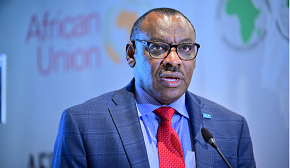The United Nations Economic Commission for Africa (ECA) Executive Secretary Claver Gatete, has commended COP27 for setting up the Loss and Damage Fund, a process started nearly three decades ago that concluded at the start of the ongoing COP 28.
Speaking at a side event on Assessing loss and damage: methodological challenges and prospects he said, “COP28 has started positively, with the adoption of the recommendations of the Transitional Committee on Loss and Damage; The loss and damage fund, with funding pledges amounting to over $400 million dollars so far, marks the beginning of a very important era in our efforts to address climate change and its impact. The side organized by the Economic Commission for Africa (ECA) and African Union on the side lines of COP 28 in Dubai on 3 December 2023.
“Loss and damage”, the harms inflicted by climate change that go beyond what people can adapt to, refers to a range of impacts including lost lives; monetary costs from the destruction of infrastructure, buildings, crops and other property; loss of ecosystems and cultures, and so on. After nearly three decades of negotiation, COP27 reached an historic agreement to create and operationalize a fund to help lower-income countries respond to and recover from climate change induced losses and damages.
Delegates meeting in Dubai for COP28 on 30 November 2023, agreed on the operationalization of a fund that would help compensate vulnerable countries coping with loss and damage caused by climate change by ensuring that vital infrastructure can be rebuilt or replaced with more sustainable versions.
“We are aware that there is much work to be done to make the fund operational. We are optimistic that before the end of this COP, we will have agreed upon the necessary arrangements to make the fund operational and receive more pledges to make it financially viable,” he said.
According to Mr. Gatete, projections show that the economic costs of climate change in developing countries will reach between US $290 billion and US $580 billion annually by 2030. Thus, there is a need to rapidly scale up funding for Loss and Damage, including diversification of funding sources and domestic resource mobilization.
AUDA-NEPAD representative, Estherine Fotabongsaid issues of governance, capitalisation, and operationalisation need to be addressed as US $200billion is needed for the loss and damage fund to become operational.
“Africa’s ability to access is limited. Our member states have ideas for programmes to package them with the right ingredients, but we want to move from past experiences that made access to financing difficult,” said Fotabong. She also stressed the need to build the capacity of member states to access the fund with strong collaboration with Afreximbank and other actors; and the importance centralizing science by defining the methodology for access to the funding.
Mr. Gatete informed the meeting that ECA is working on updating the model-based methodology that was initially developed in 2013 “to help with accurate information in decision-making regarding fund allocation. Additionally, ECA is contributing to the advancements in attribution science to enhance the accuracy of loss and damage assessments.”
ECA is also supporting member states to build their capacity and improve their access to the fund, including supporting initiatives for resilience building, rehabilitation, and reconstruction of infrastructure and ecosystems.
“These efforts are crucial for the successful operationalization of the fund and ECA remains committed to supporting African member states to build capacity to fully benefit from the operationalization of the fund,” said Mr. Gatete, adding, “we stand committed to supporting the African Group of Negotiators in their work on Loss and damage.”

